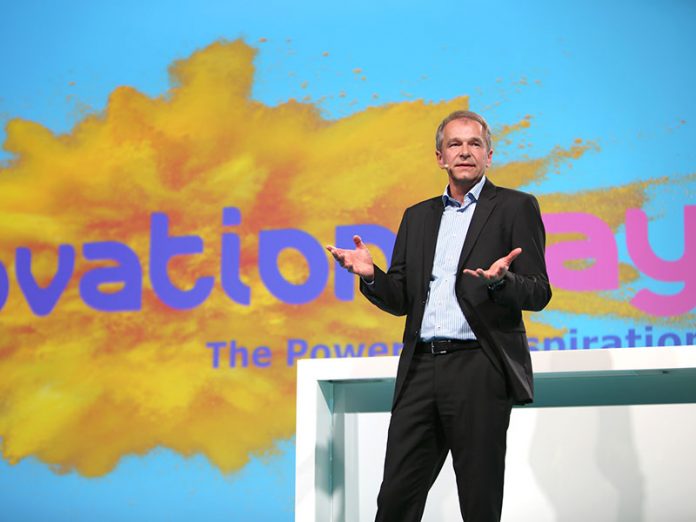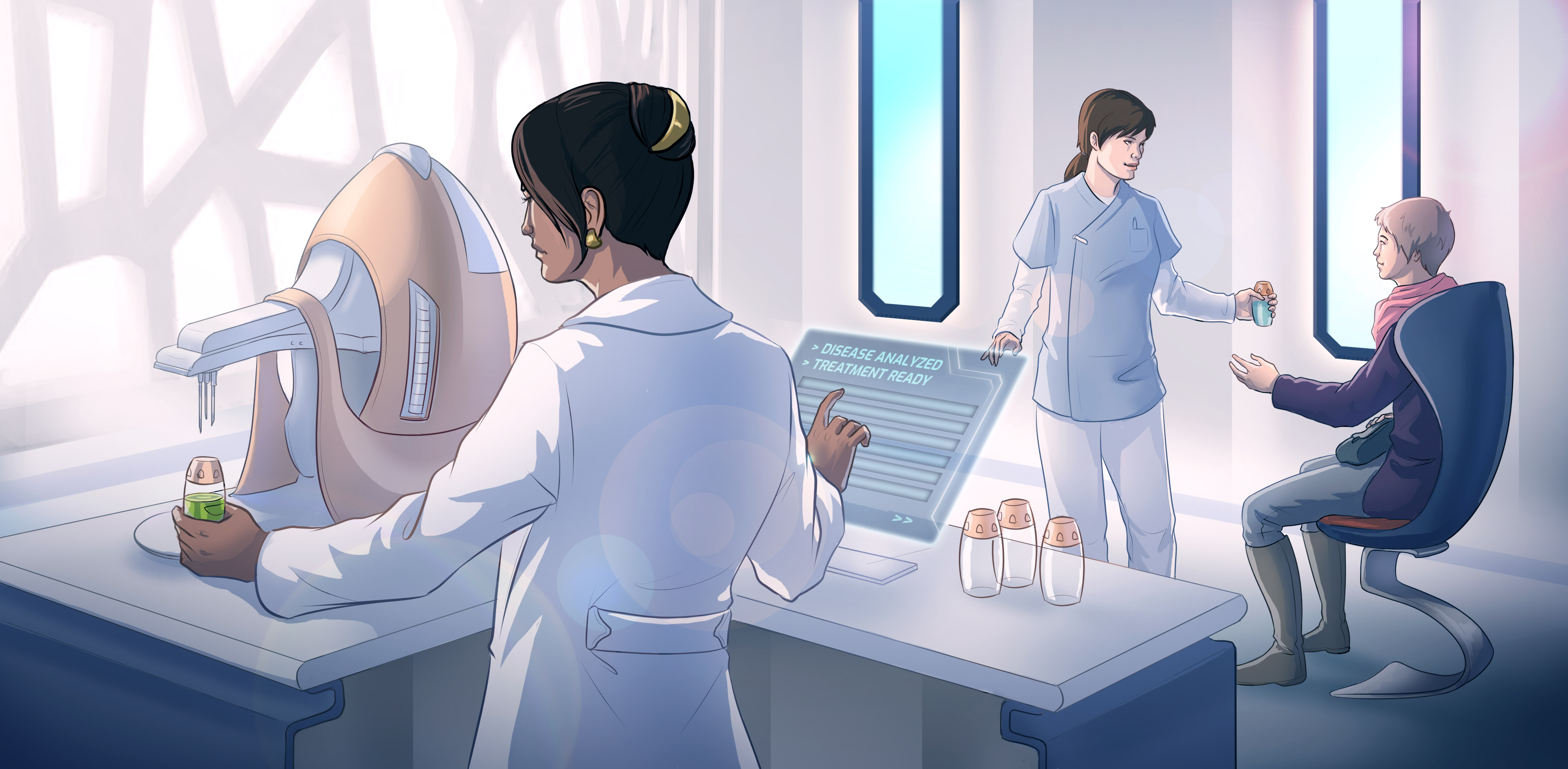The future holds daunting challenges for the human race, and some good news wouldn’t come amiss. Here, Ulrich Betz gives us some uplifting background on ambitious initiatives around science and technology aimed at addressing those challenges. And, as he explains, the issues of tomorrow are not only technological, but also have a strong moral dimension.
When Merck’s CEO Stefan Oschmann announced the roll-out of the Merck Future Insight Prize1 on July 17th 2018 at the legendary Curious2018 – Future Insight Conference in Darmstadt, Germany2 (Curious2018 – Future Insights in Science and Technology (Springer, ISBN978-3-030-16060-9)) on the occasion of the company’s 350th anniversary, nobody was yet talking about, even knew about, SARS-CoV-2, the new coronavirus that would, 17 months later, break out in China and send shockwaves around the globe. Yet the foresight was amazing, as already, back in spring 2018, Merck had selected “Pandemic Preparedness”, the search for new science and technologies to fight the threat of newly emerging viral diseases with pandemic potential, as the topic on which its €1m Future Insight Prize would be awarded the following year. The Future Insight Prize is based on the dream product concept. A dream product is something that is highly desirable but cannot be realised with the current state of science and technology. The Merck Future Insight Prize recognises and enables top scientists whose work is laying the required scientific and technological foundations to enable a realisation of the visionary dream product years down the road. The first visionary dream product concept, composed with the help of an international scientific advisory board, was the “Pandemic Protector”, which, starting with a clinical sample of a person infected with an unknown pathogen, is able to produce an agent to cure or prevent infection of others within a clinically relevant time frame. On July 9th 2019, the Future Insight Prize was awarded for the first time and presented to two research teams, the team of James E. Crowe from Vanderbilt University and the team of Pardis Sabeti from the BROAD institute. The Merck Future Insight Prize will be awarded annually for the next 35 years. In its next instalment, the focus will lie on the issue of multi-drug-resistant bacteria, an area with tremendous unmet and growing medical need. Researchers will be honoured whose work contributes to the later realisation of the dream product “Multi Drug Resistance Breaker”. The dream product is a series of novel, narrow-spectrum antibacterial agents that are able to cure any bacterial infection without inducing drug resistance, empowered by a one-hour diagnostic test. The prize will be presented on July 14th 2020 at the Curious2020 – Future Insight Conference in Darmstadt, Germany3. The Curious Future Insight Conference is one of the most prominent gatherings on the future of science and technology. Some of the world’s best scientists and most accomplished entrepreneurs come together to present their work, to shape the future, to solve the challenges of today and to enable the dreams of a better tomorrow. With the slogan “Science for a better tomorrow”, the conference covers a wide range of topics, such as healthcare, life sciences, synthetic biology, nutrition, material sciences, digitalisation, energy, mobility, the secrets of the human brain, as well as new ways of working together. The conference will feature more than 70 top speakers, including many Nobel laureates, and also comprises panel discussions organised in collaboration with Nature and AAAS/Science. Future editions of the Future Insight Prize will cover the areas of nutrition (a dream product aimed at feeding the growing world population) in 2021, and energy (a dream product to reverse the effects of climate change) in 2022. The decision on which research team receives the prize is made by a distinguished jury of more than 70 eminent scientists, including several Nobel laureates4.
Also at the Curious2020 – Future Insight Conference, the newly created Nature-Merck Spinoff prize will be presented for the first time. The Nature-Merck Spinoff Prize has been established by Nature Research in partnership with Merck, the world’s oldest pharmaceutical and chemical company and a vibrant player in science and technology, to showcase and celebrate global excellence in the application of academic research through the creation of spin-off companies. Award winners will demonstrate exceptional ability in pursuing the commercial application of original, high-quality scientific research. The Spinoff Prize aims to recognise companies that offer potential to bring new products or services to the marketplace and make a positive impact on the world. The organisation from which the underpinning research originated must be a university or a research institute. The prize will be awarded in the following categories: 1) pharmaceuticals, biotechnology and medical technology; 2) agriculture and food technology; 3) chemicals and advanced materials (life and health sciences applications); and 4) digital technologies (life and health sciences applications)5.
While the Curious2018 – Future Insight Conference was fully and exclusively sponsored and organized by Merck on the occasion of its 350th anniversary, the 2020 event is open for additional partners to join. The mission “Science for a better tomorrow” and the corresponding Curious2020 – Future Insight Conference are now supported by close to 100 different organisations6.
To advance the progress of science and technology in 2020, Merck is also offering a series of research grants in the areas of drug discovery, bioreactor design for cultured meat, next-generation machine learning and pandemic preparedness7. In addition, a series of research competitions has been initiated in the areas of lab digitalisation, impact factor prediction and electronic chemicals8.
Young talent is a key factor in building a bright future. In 2020, Merck is conducting the 10th Anniversary Innovation Cup9. At the Innovation Cup, some of the brightest students from all over the world are invited to a one-week summer camp at Merck. The young talents are combined with company retirees in teams of high diversity to brainstorm and develop new ideas for innovative new products. The teams receive training, support and coaching from company managers, scientists, and alumni of previous editions. On the last day, the teams pitch their project plan to a jury composed of Merck internal and external experts, which selects the winning team to be awarded the Merck Innovation Cup, along with €20,000. Alumni stay connected, meet annually and are now starting to be a source for the emergence of new, highly innovative joint projects in this amazing community. For the first time in the history of the Innovation Cup, we are now expanding to even younger talent, with one team composed of participants prior to, or at the beginning of, their undergraduate studies. In addition, alumni who have already won the cup in previous years are having another go in 2020 with a super-experienced “winners team”.
Humanity is facing huge opportunities, but also considerable challenges. With a predicted population of up to 10 billion people by 2050, we will only be able to solve these challenges with further advancements in science and technology. Going backwards is not an option. Especially in the age of growing defence budgets, pressure from global migration, climate change and collapsing ecosystems, it is important to ensure that science and technology are provided with the resources they need to advance and make further progress. To support this goal, on the occasion of Merck’s 350th anniversary in 2018, the Darmstadt Science Declaration was rolled out. The declaration is a call to all nations, societies and organisations to devote more resources to the advancement of science and technology. The aim is to shape public opinion and create a global movement resulting in a boost for research and development, along with increased emphasis on attracting bright, young talent to science and technology. The objective is also to promote an optimistic, utopian outlook to ensure that the technologies required for a bright and sustainable future are made available in time. The declaration reads: “We, the signatories, are people of different national origins, creeds and convictions. We all firmly believe that human progress is deeply linked to further advances in science and technology. We are truly convinced that science is a force for good which enables us to solve many of mankind’s most pressing challenges. We believe that huge opportunities will arise from future science and technology efforts. Yet we are also very well aware of the responsibility and accountability we bear for the new technologies that are realised. We call on all nations, societies and organisations to devote more resources to the advancement of science and technology. We encourage the international community to join forces in battling debilitating diseases, ensuring sufficient food for a growing world population, stopping the destruction of our environment, and engaging in joint endeavours to elucidate the secrets this fascinating universe holds.”
The declaration has in the meantime been signed by thousands of people, including many Nobel laureates, and mirrored by declarations in many major cities all over the world. It can be signed online by anybody who supports this cause at http://make-science-not-war.org.
It is important to ensure that new technologies are applied for the greater good. A first, important step in building a better world is changing ourselves, the way we think, the way we act, the way we lead. Here are five principles that could form a basis for a new “loyalty-based leadership” that has the potential to transform organisations: 1) Truth – communicate the truth and nothing but the truth; 2) Love – the well-being of others is not less important than mine; 3) Courage – be no coward, take action; 4) Liberty – accept that other people can think differently; and 5) Spirituality – be inspired for a greater cause. Discussions around these new potential transformative leadership principles have started in social media at #loyaltybasedleadership.
When the Club of Rome published its study “The limits to growth” in 1972, it was a real landmark. The study comprised a computer simulation of exponential economic and population growth with a finite supply of resources. The repor’s authors were Donella H. Meadows, Dennis L. Meadows,, Jørgen Randers, and William W. Behrens III, representing a team of 17 researchers. The study predicted a global collapse in the 2030s in a “business as usual” scenario, due to growing pollution and resource scarcity. The real-world statistics of key indicators have unfortunately developed pretty much in line with that scenario so far. We will only be able to break that dynamic with new and better technologies. Otherwise we will soon hit the maximum capacity of the global ecosystems.
But there is hope. The truth is that, in fact, there are no limits to human growth, and we can certainly grow beyond this planet. The universe is huge, the future is bright, and nothing will be impossible.
About the Author
 Ulrich A.K. Betz, Vice President of Innovation Merck, is responsible for innovation management and strategic academic collaborations at Merck. He is an accomplished R&D manager with >20 years of experience in the pharmaceutical and chemical industry, including positions in the President’s Office Merck Biopharma and positions reporting directly to the Heads of Research and Development at Bayer and Merck.
Ulrich A.K. Betz, Vice President of Innovation Merck, is responsible for innovation management and strategic academic collaborations at Merck. He is an accomplished R&D manager with >20 years of experience in the pharmaceutical and chemical industry, including positions in the President’s Office Merck Biopharma and positions reporting directly to the Heads of Research and Development at Bayer and Merck.
In his current role for example he designed and implemented the Merck Innovation Cup, the Curious-Future Insight Conference, the Merck Future Insight Prize, the Darmstadt Science Declaration, the idea competition innospire and the BioMed X Outcubator.
Prior to joining Merck in 2005, he worked 7 years for Bayer AG in various scientific and managerial positions in Pharma Research. Ulrich received his PhD in functional genomics and immunology from the University of Cologne and his diploma in biochemistry and physiological chemistry from the University of Tübingen.
He is a co-inventor of the marketed anti-viral drug Letermovir (Prevymis) and Pritelivir (Phase II) and the innovation incubator innospire he designed led to the development of bintrafusp alfa (Phase II).
Ulrich has won several innovation awards such as the German Industry Innovation Award (the world’s oldest innovation award), two International Business Awards (Stevie Gold Awards Executive of the Year – Pharmaceuticals and Innovator of the Year), Stevie Gold Germany Award (R&D manager of the year Germany), Edison Award, the Bio IT world best practice award, and the German Idea Award.
Ulrich is author and co-author of ~90 publications and patents (e.g. Cell, Nature Medicine, Nature Biotechnology).
References
1. http://futureinsightprize.merckgroup.com
2. http://curious2018.com
3. http://curious2020.com
4. http://futureinsightprize.merckgroup.com
5. https://www.nature.com/nature/awards/spinoffprize
6. http://curious2020.com/partners
7. http://researchgrants.merckgroup.com
8. http://researchchallenges.merckgroup.com
9. http://innovationcup.merckgroup.com
































![“Does Everyone Hear Me OK?”: How to Lead Virtual Teams Effectively iStock-1438575049 (1) [Converted]](https://www.europeanbusinessreview.com/wp-content/uploads/2024/11/iStock-1438575049-1-Converted-100x70.jpg)




